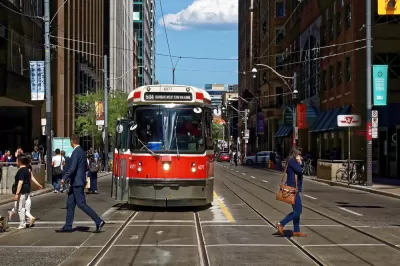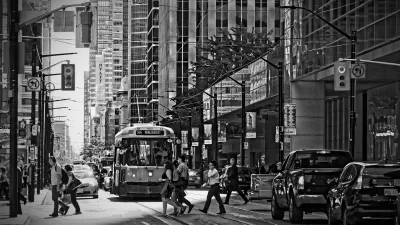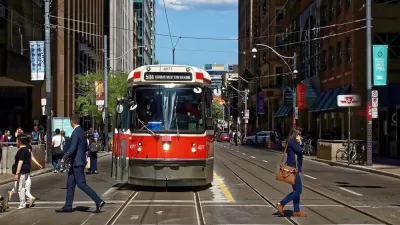The city of Toronto did something radical and gave its streetcar its own lane on King Street as part of a pilot project launched in 2018. The results included improved service and increased ridership.

"More than a year after [Toronto] reconfigured a major downtown thoroughfare to give priority to streetcars over private vehicles, the King St. pilot could be here to stay," reports Ben Spurr.
A recently released report [pdf], prepared by the Toronto Transit Commission, recommends making the pilot project permanent. In the report, according to Spurr, "city staff detail extensive monitoring of nearly all aspects of the King St. project, and conclude it has achieved its goal of improving streetcar operations on the TTC’s busiest surface route with minimal negative effects on traffic and surrounding businesses."
The idea of making the King St. pilot permanent already has support from Mayor John Tory, according to the article, and the City Council is expected to debate the issue this week.
For more insight, Angie Schmitt also writes about the findings of the report, touting the success of the city's decision to give priority to the streetcar instead of cars on the highly trafficked streetcar corridor. Ridership grew by 16 percent after the city decided to give the streetcar its own lane, free of conflicts with automobiles in the right of way.
FULL STORY: City report recommends making King St. pilot permanent

Planetizen Federal Action Tracker
A weekly monitor of how Trump’s orders and actions are impacting planners and planning in America.

Maui's Vacation Rental Debate Turns Ugly
Verbal attacks, misinformation campaigns and fistfights plague a high-stakes debate to convert thousands of vacation rentals into long-term housing.

Restaurant Patios Were a Pandemic Win — Why Were They so Hard to Keep?
Social distancing requirements and changes in travel patterns prompted cities to pilot new uses for street and sidewalk space. Then it got complicated.

In California Battle of Housing vs. Environment, Housing Just Won
A new state law significantly limits the power of CEQA, an environmental review law that served as a powerful tool for blocking new development.

Boulder Eliminates Parking Minimums Citywide
Officials estimate the cost of building a single underground parking space at up to $100,000.

Orange County, Florida Adopts Largest US “Sprawl Repair” Code
The ‘Orange Code’ seeks to rectify decades of sprawl-inducing, car-oriented development.
Urban Design for Planners 1: Software Tools
This six-course series explores essential urban design concepts using open source software and equips planners with the tools they need to participate fully in the urban design process.
Planning for Universal Design
Learn the tools for implementing Universal Design in planning regulations.
Heyer Gruel & Associates PA
JM Goldson LLC
Custer County Colorado
City of Camden Redevelopment Agency
City of Astoria
Transportation Research & Education Center (TREC) at Portland State University
Jefferson Parish Government
Camden Redevelopment Agency
City of Claremont




























